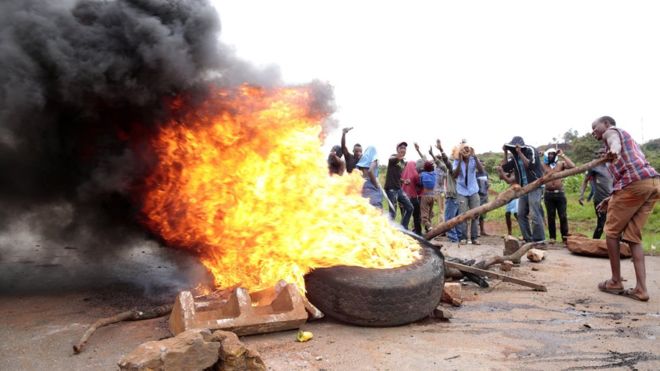South Africa has said it rejected a request from Zimbabwe for an emergency loan of $1.2bn (£932m) in December.
Zimbabwe's government had hoped the cash would help stabilise the economy and resolve fuel shortages in the country.
South Africa did not have "that kind of money", a Treasury spokesman said.
A fuel price hike imposed shortly after the request was rejected has led to violent clashes. The opposition says four of its MPs have been detained.
The government has blamed the opposition Movement for Democratic Change (MDC) for stoking the violence.
The MDC has denied this and its leader Nelson Chamisa told the BBC that many of its members had been arrested including the four MPs.
Rights groups say at least 12 people have been killed in the crackdown on the protests.
They say many more have been beaten in clashes with security forces but there has been no official confirmation of this.
Zimbabwe's president Emmerson Mnangagwa announced a steep increase in the fuel price last week, sparking angry protests in the capital, Harare, and the south-western city of Bulawayo.
On Twitter, he said he was cutting short his current foreign tour to return home "in light of the economic situation".
Read also: Zimbabwe to introduce new currency due to dollar shortage
What happened during the protests?
Police have been violently cracking down on the demonstrations against the fuel price rise, with reports of door-to-door searches and use of live ammunition.
The UN has called on the government to halt the "excessive use of force" by police.
But the Zimbabwean government on Sunday said the security forces' actions were just "a foretaste of things to come".
News of the violent crackdown emerged despite the country's internet, including social media and messaging apps, being cut off.
Speaking to the state-owned Sunday Mail newspaper, a presidential spokesman blamed the opposition Movement for Democratic Change (MDC) for the violence that has accompanied the protests.
"The MDC leadership has been consistently pushing out the message that they will use violent street action to overturn the results of [last year's] ballot," George Charamba said.
The opposition rejected a court ruling in August that confirmed that President Mnangagwa had beaten Mr Chamisa.
Why has the fuel price increased?
The price rise was aimed at tackling shortages caused by an increase in fuel use and "rampant" illegal trading, President Mnangagwa said.
But many Zimbabweans, worn down by years of economic hardship, suddenly found they could not even afford the bus fare to work.
The new prices mean Zimbabwe now has the most expensive fuel in the world, according to GlobalPetrolPrices.com
They feel that the president, who has been on a tour of Russia and Asian countries, is failing to live up to his promises following his election last year in disputed polls.
He has been struggling to revive the economy, which is experiencing high inflation while wages have stagnated.
Access to the internet was intermittent throughout the week, but people found they were unable to use social media and the WhatsApp messaging platform, which has become a common way to share news.
Source: BBC
Â





